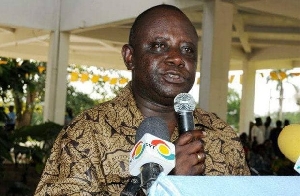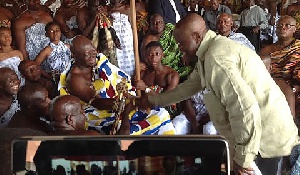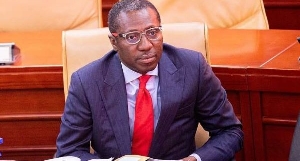 Dr Franklin Manu Amoah is the first prosecution witness
Dr Franklin Manu Amoah is the first prosecution witness
The prosecution's claim that former COCOBOD Chief Executive Dr Stephen Opuni ordered CRIG scientists to shorten the testing of fertilizers, specifically lithovit, has yet again been shot down by a soil scientist at CRIG, a new defence witness.
It has been revealed in court that even before Dr Opuni assumed office, CRIG had already finished its work on testing lithovit foliar fertilizer supplied by Agricult Ghana Limited and had prepared the scientific report on the product.
Jerome Agbesi Dogbatse, who contributed to the draft report on lithovit foliar fertilizer, told the Accra High Court yesterday, April 25, 2024, that CRIG concluded its test on lithovit way before November 2013.
The witness joined the Cocoa Research Institute of Ghana (CRIG) at Tafo on November 4, 2013.
"I told the police that the product (lithovit) was tested and completed before I joined CRIG," he said.
Though Dr Opuni was appointed in December 2013, he assumed office as the Chief Executive of the Ghana Cocoa Board in January 2014.
It would be recalled that the first prosecution witness, Dr Franklin Manu Amoah, in his evidence-in-chief in July 2018, alleged in court that, immediately after assuming office, Dr Opuni gave oral directives to scientists to shorten the testing of fertilizers at the time lithovit was being tested by CRIG.
He alleged that, due to the directive, the testing period for lithovit was reduced to six months.
"My Lord, I wish to state that there were one or two other platforms at which Dr Opuni insisted on this directive, and one that I remember clearly was in his office, where myself, Mr Akrofi, Dr Agyeman Dwomoh, and Mr Alex Afrifa were all invited to his office in Accra on the same issue of reducing the test period. My Lord, and in attendance at the meeting were Dr Francis Baah, who was the then manager in Dr Opuni's office, and also Mr James Kofi Kutsoatsi, who was the Deputy Chief Executive in charge of Operations," Dr Franklin Manu told the court.
But Dr Francis Baah, who was named as present at that meeting and was then working as the office manager in the Chief Executive's office, has vehemently denied the allegation.
He told the court presided over by Justice Aboagye Tandoh on April 17, 2024, that he never attended any such meeting.
"No, my Lord, I do not recall any such meeting or being present in any such meeting," Dr Francis Baah, who is now the Director of Research, Monitoring, and Evaluation at COCOBOD, said.
Dr. Baah also informed the court that Mr James Kofi Kutsoatsi, whom Dr Amoah claimed was also in the meeting held in January 2014, rather joined COCOBOD in April 2014, months after the supposed meeting had taken place.
"Yes, my Lord, I agree with counsel; if he (Mr. Kutsoatsi) had not been appointed at that time, how could he attend such a meeting? I don't recall attending such a meeting," Dr. Baah maintained.
As a confirmation of Dr Baah's position that there was never a meeting where Dr Opuni ordered the shortening of fertilizers, Jerome Agbesi Dogbatse also indicated in court that Dr F.M. Amoah's claim was false.
Mr. Jerome Dogbatse, who joined CRIG in November 2013 as a soil scientist before Dr. Opuni's appointment, told the court that he did not even meet the testing requirements for lithovit fertilizer.
The witness, who was subpoenaed to testify on behalf of businessman Seidu Agongo, recalled telling the Adu-Ampomah Committee when he appeared before it in September 2017 that the work on lithovit had already been done before he was employed at CRIG.
He repeated this fact to the Financial Forensic Unit of the Police CID later, around that same period, during investigations into COCOBOD's purchase of lithovit liquid fertilizer between 2014 and 2016.
"Yes, my Lord, I told the police that the [nursery] work was done before I joined [CRIG]," Mr. Dogbatse recounted.
According to him, he told the CID investigators that he only reviewed the draft report on Lithovit done by Dr Alfred Arthur and Mr A. A. Afrifa, who was the Head of the Soil Science Division at CRIG: the three were the only soil scientists at CRIG at the time.
"What I told the police was that they showed me a report and asked me that have I seen this report before, and I said yes, I have seen the report before, and then they mentioned that this is the final report on the work on lithovit. then I told them if that is the final report, nobody showed it to me, but what I worked on was the draft report," the witness said.
"Did you tell the police anything about making comments on any report?" lawyer Benson Nutsukpui, counsel for Seidu Agongo, asked Mr Dogbatse.
The witness replied, "Yes, my Lord, I told them that I made some comments for the attention of the lead author. That is what I meant by review."
The soil scientist also said that as part of his orientation after joining CRIG, he was taken to a nursery site, where he was shown seedlings treated with fertilizers, including lithovit and untreated seedlings.
"The difference between them are that the treated seedlings are doing better than the untreated seedlings," he recalled.
Based on his statement, many wonder about Dr. Opuni's involvement in the scheme of things. Others doubt how he would be able to issue a directive to CRIG scientists on lithovit before his appointment and also at a time when COCOBOD had a substantive chief executive in Mr Anthony Fofie.
"It is clear and obvious that there was a calculated attempt to dirty Dr Stephen Opuni with false claims. This is just to besmirch a man with reputable credibility," a journalist who doesn't want to be named pointed out.
The former COCOBOD Chief Executive, Dr. Opuni, and businessman Seidu Agongo have been accused of defrauding by false pretences, willfully causing financial loss to the state, corruption by public officers, and contravention of the Public Procurement Act.
- I’m 100% certain lithovit submitted to me for testing at CRIG is liquid – Lead scientist
- Cocobod trial: RM&E Director schools Chief State Attorney in court
- CEOs of COCOBOD sign contracts on behalf of the board - Witness
- COCOBOD's CODAPEC/Hi-TECH Unit advises on fertiliser purchases not CEO - RM&E Director informs court
- Adu-Ampomah and Dr. Amoah know Lithovit is liquid fertiliser – COCOBOD Director tells court
- Read all related articles












